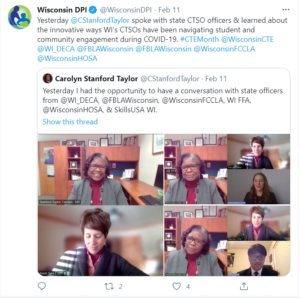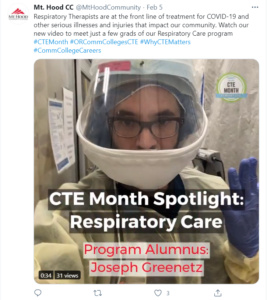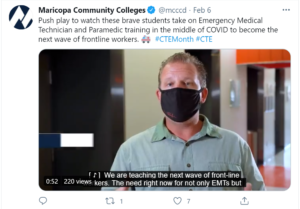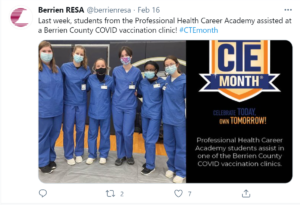While many states are still operating in a virtual environment and facing challenges to executing traditional Career Technical Education (CTE) Month activities, state CTE leaders still found creative ways to promote CTE programs and their benefits for learners.
In honor of CTE Month, this post highlights how states have leveraged virtual events, digital media, Career Technical Student Organizations (CTSOs), and collaborative convenings to elevate the learner voice in celebrating CTE, connect CTE to timely topics and bring CTE leaders together to plan for the future.
Recognizing CTE Month
17 states and territories presented proclamations or resolutions to commemorate CTE Month.
Sharing CTE Experiences through Virtual Events
Instead of traditional classrooms, industry and state capitol visits, many states utilized virtual events to raise awareness of CTE. Some benefits for this format emerged, including the ability to highlight a wider range of programs and connect policymakers with learners that may not have the resources to meet in-person.
 Arkansas preserved its annual ‘Day at the Capitol’ with a virtual event that included greetings from the Governor, Secretary of Education, state Association for Career Technical Education (ACTE) leadership, and state CTSO leaders. Learner testimonials and CTE program demonstrations were shared via dozens of video submissions from across the state. The state ACTE organization also hosted a digital escape room as a fun activity for CTE students.
Arkansas preserved its annual ‘Day at the Capitol’ with a virtual event that included greetings from the Governor, Secretary of Education, state Association for Career Technical Education (ACTE) leadership, and state CTSO leaders. Learner testimonials and CTE program demonstrations were shared via dozens of video submissions from across the state. The state ACTE organization also hosted a digital escape room as a fun activity for CTE students.
 Oregon’s Community College Association hosted virtual weekly ‘Workforce Wednesdays’ throughout the month to highlight in-demand industries and provide information to access aligned career pathways through Oregon’s community colleges.
Oregon’s Community College Association hosted virtual weekly ‘Workforce Wednesdays’ throughout the month to highlight in-demand industries and provide information to access aligned career pathways through Oregon’s community colleges.
Wisconsin’s State Superintendent conducted four virtual CTE program visits and a roundtable with state leaders from six CTSOs to hear their perspectives about preserving the value of CTE programs and leadership opportunities in the midst of the coronavirus pandemic.
Digital Media Campaigns
States utilized a variety of strategies to integrate data, learner voices and storytelling into innovative campaigns to raise awareness of CTE, market learner outcomes and highlight diversity and community.
North Dakota released a series of six videos utilizing the theme ‘I Love CTE” that compiled photos of students and instructors displaying ‘I Love CTE’ signs in CTE classroom settings that feature the creative, collaborative and hands-on aspects of CTE programs.
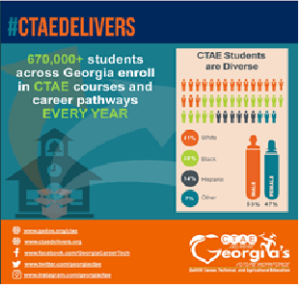 Georgia conducted a daily #CTAEDelivers Twitter campaign with colorful and informative graphics to increase awareness of CTE and its positive outcomes for learners.
Georgia conducted a daily #CTAEDelivers Twitter campaign with colorful and informative graphics to increase awareness of CTE and its positive outcomes for learners.
Colorado’s Association for Career and Technical Education elevated videos created by the Colorado Community College Association as part of their CTE Month Advocacy Toolkit and annual Showcase for Legislators held virtually this year. These videos, segmented for parents, students and school counselors, showcased CTE programs throughout the state using targeted messages for each audience. These videos were created as part of Colorado’s participation in Advance CTE’s grant, Strategies for Attracting Students to High-Quality CTE.
Connecting CTE and Essential Careers
Several CTE programs leveraged CTE Month to contribute to the timely conversation of the value of essential workers, and the importance of CTE in skillbuilding for in-demand careers that have been essential to coronavirus pandemic response and recovery. These communications elevated how learners felt empowered to excel in a difficult learning environment and contribute to their community.
Oregon’s Mt. Hood Community College utilized CTE program graduates to highlight pathways to in-demand careers in healthcare.
Arizona’s Maricopa Community College highlighted first responder pathways and how learners led problem-solving efforts to continue their learning in virtual and hybrid learning settings.
Learners from the Berrien Regional Education Service Agency in Michigan had hands-on experience supporting coronavirus response efforts this month.
Reenergizing CTE Leaders and Planning for the Future
Several states utilized CTE Month as an opportunity to convene CTE leaders to conduct professional development, share best practices and plan for the future.
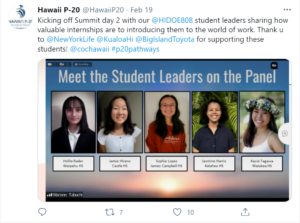 Hawaii held a Pathways Summit February 18 and 19 co-hosted by the Hawaii Chamber of Commerce and Hawaii P-20, a partnership among the Executive Office on Early Learning, the Hawai‘i State Department of Education and the University of Hawai‘i System. The Summit focused on best practices for education-industry partnerships, work-based learning experiences and short-term credential programs while also providing a platform for students to share their experiences.
Hawaii held a Pathways Summit February 18 and 19 co-hosted by the Hawaii Chamber of Commerce and Hawaii P-20, a partnership among the Executive Office on Early Learning, the Hawai‘i State Department of Education and the University of Hawai‘i System. The Summit focused on best practices for education-industry partnerships, work-based learning experiences and short-term credential programs while also providing a platform for students to share their experiences.
This weekend, California’s CTE division will assist California Partnership Academies in hosting their annual Educating for Careers Conference, a professional development event for CTE instructors and administrators focused on improving learner experiences and outcomes.
Georgia hosted its statewide Career, Technical, and Agricultural Education Winter Leadership Conference virtually this month with over 240 CTE leaders in attendance.
We hope these creative celebrations give you more ideas for next year and keep you energized as CTE Month comes to a close! Visit our Communications page in the Learning Resource Center for resources to continue your efforts to strategically communicate about CTE.
Stacy Whitehouse, Senior Associate Communications and State Engagement

